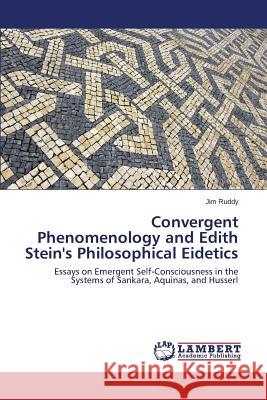Convergent Phenomenology and Edith Stein's Philosophical Eidetics » książka
Convergent Phenomenology and Edith Stein's Philosophical Eidetics
ISBN-13: 9783659660078 / Angielski / Miękka / 2014 / 124 str.
From the FOREWORD to this book by J. N. MOHANTY: "It is undoubtedly a great pleasure to read a competent work in which three of the greatest philosophers of the world-Aquinas, Sankara and Husserl-are treated with equal respect, their philosophies 'synthesized, ' as a result of which a new interpretation of Husserl is just on the verge of emerging...Ruddy does take out a part from the Aristotle-Aquinas heritage-the theory of real relations, of relations which are asymmetrical, real from one side and intentional from another, and embeds it in Husserl's transcendental phenomenology. The result is what the author calls "convergent phenomenology" embodying the truth that Husserlian pure object consciousness points beyond itself to the pure subject consciousness of God as He is in Himself. With this finding, the theme of 'God' is drawn into, and limits, transcendental phenomenology. I hope this faithful re-interpretation of Husserlian phenomenology will receive the close attention of Husserl scholars and of phenomenologists that it deserves."
From the FOREWORD to this book by J. N. MOHANTY: "It is undoubtedly a great pleasure to read a competent work in which three of the greatest philosophers of the world-Aquinas, Sankara and Husserl-are treated with equal respect, their philosophies synthesized, as a result of which a new interpretation of Husserl is just on the verge of emerging...Ruddy does take out a part from the Aristotle-Aquinas heritage-the theory of real relations, of relations which are asymmetrical, real from one side and intentional from another, and embeds it in Husserls transcendental phenomenology. The result is what the author calls "convergent phenomenology" embodying the truth that Husserlian pure object consciousness points beyond itself to the pure subject consciousness of God as He is in Himself. With this finding, the theme of God is drawn into, and limits, transcendental phenomenology. I hope this faithful re-interpretation of Husserlian phenomenology will receive the close attention of Husserl scholars and of phenomenologists that it deserves."











